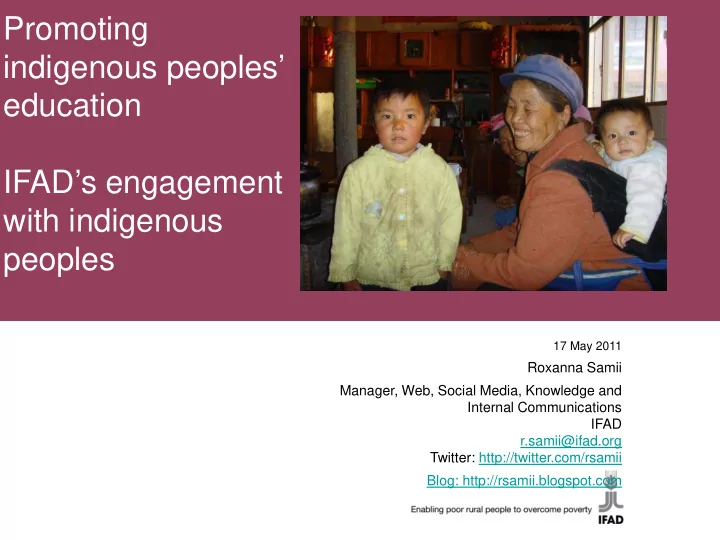

Promoting indigenous peoples’ education IFAD’s engagement with indigenous peoples 17 May 2011 Roxanna Samii Manager, Web, Social Media, Knowledge and Internal Communications IFAD r.samii@ifad.org Twitter: http://twitter.com/rsamii Blog: http://rsamii.blogspot.com
IFAD’s policy on engagement with indigenous peoples • empowers indigenous peoples to improve their well-being, income and food security through self-driven development that builds on their identity and culture • promotes tailored approaches that respect their values and build upon their strengths • Is in line with the UN Declaration on the Rigths of Indigenous Peoples and the UNDG Guidelines • is result of consultations with indigenous peoples as well as IFAD’s experience and lessons learnt
Nine principles of engagements • Cultural heritage and identity are the assets of indigenous peoples • IFAD: - builds on indigenous peoples cultural distinctiveness - assists communities to take full advantage of their tangible and intangible heritage Development with identity and culture is part of the assertion of indigenous peoples’ right to remain as diverse and distinct cultures and communities and to pursue their own development within this context. Source: Indigenous Peoples Development with Identity and Culture or Self-Determined Development, Victoria Tauli-Corpuz, Chair of UNPFII, 2008
The Ticuna Educational Project (PRAIA) • Brazilian Amazon • $400,000, co-financed by IFAD and Brazilian government • Project reached out to majority of Ticuna people, and Kokama and Kaixana people • Project improved quality of Ticuna schools by: - training Ticuna teachers to design training modules and deliver bilingual courses - Improving educational facilities - Strengthening the oral literature of the Ticuna people by capturing their knowledge in publications
Impact and results • Indigenous communities empowered • Build capacity of indigenous communities • Created first training school for indigenous teachers in Brazil • School awarded diplomas and other academic certificates • Produced of high quality didactic material • Training curricula used by the Ministry of Education as a model • Ticuna language now part of the official program • Project assessed directly by indigenous peoples The project has helped overcome historical barriers and improved opportunities for autonomous management of the indigenous educational needs
The Indigenous Peoples Assistance Facility (IPAF)
The I ndigenous P eoples A ssistance F acility (IPAF) • An innovative demand driven • Provides small grants up to $50,000 • Facility supports projects that: - include indigenous peoples in development operations - improve indigenous peoples access to key decision- making processes - empower indigenous peoples to find solutions to challenges they face
Examples of IPAF microprojects and indigenous peoples’ education • Bangladesh: Introduction of Garo language training in 50 community based schools in the North East • China: Introduction of Naxi language through traditional children songs and games in Yulong • Botswana: Production of a documentary on the cultural heritage of the Bakalanga ba ka Changate • Peru: Capacity building on indigenous peoples rights and empowering women handicrafts production in 14 Awajun communities
IPAF projects supporting indigenous education • Bolivia: Dissemination of information on indigenous peoples and women rights using 50 indigenous radio stations • India: Revitalization of historical and cultural roots of Santal community in Jarkhand and West Bengal • El Salvador: Strengthening knowledge of traditional weaving among indigenous women in Montanona area • Panama: Contributing to recovery and protection of biodiversity and indigenous traditional knowledge among Kuna women in the Comarca Kuna Yala • Peru: Mapping places related to the collective memory of Yanesha people in two areas
I am happy to be a teacher because I am an agent of transformation. The ideas planted in this course are multiplying and as a result we exchanging ideas, thinking differently, working together to improve our education system and our lives. Prof Isaque Gaspar Tomas More information available at www.ifad.org Contact: Antonella Cordone (a.cordone@ifad.org), Coordinator for indigenous and tribal issues
Recommend
More recommend